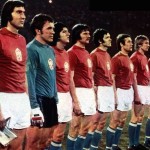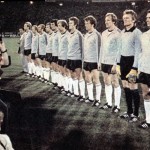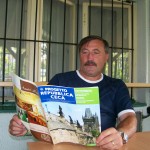Antonín Panenka has reached the age of seventy. His penalty kick, however, will remain immortal
On the evening of June 20, 1976, for the first time ever, a prestigious international event was to be decided on penalties. At the Marakana in Belgrade, capital of the then Yugoslavia, contending for the European crown were West Germany and Czechoslovakia. The Germans, who had reached the top of the World just two years earlier having beaten Johan Cruijff’s dazzling Holland side in front of their own public, enjoyed the advantages of being favorites and had no apparent weaknesses, being able to count on people like Sepp Maier, Franz Beckenbauer, Berti Vogts and Uli Hoeneß.
Czechoslovakia was an unknown team to most, perhaps not transcendental, but still respectable. Coached by Václav Ježek, the Czechoslovaks presented themselves at the European Championship having been unbeaten for twenty games and wanting to reap the rewards of a golden generation, which perhaps would be unrepeatable. The squad was composed mostly of Slovak players, such as the charismatic captain Anton Ondruš, nicknamed the “Beckenbauer of the East”, or the dynamic full-back Ján Pivarník, but the totem up front was a Czech. His name was Zdeněk Nehoda, and in his homeland he carried the attack of the legendary Dukla Prague and no one has scored more than him in the national team.
The Czechoslovakians, who already had made minced meat of the Netherlands in the semifinals, winning 3-1, took off immediately, getting a brace just before half an hour had passed. The Germans, however, shortened the distance with Dieter Müller and then drew in the final moments thanks to a header from Bernd Hölzenbein.
 With a such plot, a match like that could have only one type of ending, the most spectacular and Hollywood-like finale of all. It was written in the stars: with nothing happening in extra time the encounter was to be decided on penalties. After three impeccable shots from both sides, Russian roulette betrayed the German Hoeneß, who sent the ball into orbit generating the sarcastic joke of Beckenbauer (“they are still looking for the ball on the streets of Belgrade”), but not the Czechoslovak Ladislav Jurkemik, placing the responsibility for the coup de grace on the fifth and final penalty kicker: Antonín Panenka.
With a such plot, a match like that could have only one type of ending, the most spectacular and Hollywood-like finale of all. It was written in the stars: with nothing happening in extra time the encounter was to be decided on penalties. After three impeccable shots from both sides, Russian roulette betrayed the German Hoeneß, who sent the ball into orbit generating the sarcastic joke of Beckenbauer (“they are still looking for the ball on the streets of Belgrade”), but not the Czechoslovak Ladislav Jurkemik, placing the responsibility for the coup de grace on the fifth and final penalty kicker: Antonín Panenka.
At that moment Panenka was 28 years old, playing as an attacking midfielder in Prague’s Bohemians, with his studies as a hotel expert still incomplete. He did not really possess the physique du rôle of the modern hero, looking slightly rough with his always ruffled hair and a Stalin mustache, but he was a naive type, unconventional, indecipherable for the opposing goalie. He prepares a long run-up, almost as if he wants to savor those moments for as long as possible, and then when the Italian referee Sergio Gonella finally gives him green light, he begins to run towards the penalty spot, shortening and modulating the frequency of steps as soon as he enters the penalty area, much like a cheetah would to sneak up on its prey in the savannah. He only glances once to observe the goalkeeper’s movement, before using the tip of his boot to deliver a shot just below the bottom of the ball, raising a cloud of chalk from the spot, as if to raise a smokescreen with which to hide the trick shot he just executed, all of which occurs while Maier lies down on the ground, and in fact, the incredulous Marakana public follows the Panenka chip twirling in the air before mockingly ending up at the bottom of the net.
Panenka had just delivered the European title to Czechoslovakia, the first and only one in its history, and he did so with an action that was as daring as it was spectacular, courageous and innovative at the same time, which he had exhibited several times before in the Czechoslovak league in the Bohemians jersey. “If I had missed I would have ended up working at the ČKD factory”, he would say many years later in an interview, without hiding a bit of complacency remembering that memorable “cucchiaio (spoon)” as Italians would subsequently rename that technique in the future. “Only a fool could have kicked such a decisive penalty in that way”, commented Pelé. In fact, the deadly floating chip with which Panenka had chosen to bring down the curtain of the European championship, was one of those snapshots that place its author on the border between the concept of madness and that of a nutcase as masterfully described by the Argentine writer Julio Cortázar. “The madman thinks he’s right, while the nutcase goes his way without worrying about anything, and so it happens that while everyone stops when they see a red light, he instead steps on the accelerator and then we hope for the best”.
Although the move that would have delivered him to the immortality of antonomasia, trapping him forever in the football vocabulary, it was born from a calculated risk, based on an unspeakable confidence in his own means and on the awareness of being in possession of a fine technique. “I was pretty sure I would have scored”, the Czech midfielder would later say, sticking his chest out.
In the Bohemians shirt Panenka scored more than a hundred goals, some of which were kicked in that unorthodox manner, but for the international audience, the lob was a pleasant surprise. Moreover, at the height of the Cold War, with the iron curtain covering up the countries of the Soviet bloc, it was virtually impossible to receive any information from Eastern Europe, let alone those concerning sporting competitions.
Antonín had joined the Bohemians family as a teenager, in 1967, and would have only leave the green-and-whites in 1981, also due to a regulation that prevented players from moving before the age of thirty-two. With the green-and-whites he never won anything, except the affection of the people for whom he soon became an idol to be idolized and an award as Czechoslovakian player of the year in 1980, but it was that laboratory that inspired him to do his now famous “panenka” penalty kick.
Like all brilliant inventions, after all, even the “chip” came randomly. There was the goalkeeper of the Bohemians, Zdeněk Hruška, who after the training entertained himself by challenging Panenka on penalties in friendly challenges with a pint of beer or some change at stake, thus stimulating him to devise ever more ingenious and counterintuitive solutions to come out as the winner from the duel at eleven meters. “He was very strong on penalties. He beat me many times and I lost a lot of money because of him”, Panenka recalled joking in an interview. From this frustration Antonín would invent one of the most iconic and later imitated shots. “I began to think more and more about how to kick a penalty as effectively as possible, even at night I knew that goalkeepers usually choose one side, but if you kick the ball too hard the risk is that the goalkeeper can intervene with the leg, saving it before going to the ground, however, if contact with the ball is lighter, it becomes impossible for him to return to the center if he has already baptized one side, diving in that direction”.
Overwhelmed by glory, but not by wealth, after that legendary match Panenka remained another five years in the service of the Bohemians, before being able to fly abroad at the age of thirty-two, as the socialist regulations of the time dictated. It was now the dawn of the 1980s, when the elegant and visionary Czech midfielder found alluring offers from England and Spain on the table, but eventually decided to join the cause of Rapid Vienna and settle there for four seasons, experiencing a final flash of glory in the 1985 Cup Winners’ Cup final, eventually lost against the English Everton side. He ended his career eight years later, at the ripe age of forty-five, having used his final breaths in the dusty fields of the Austrian minor leagues, but never losing the vice that had made him famous all over the world. In total, according to a meticulous calculation he made himself, Panenka did his trademark “chip” in official competitions thirty-five times, making a fool of himself only on one occasion. Today, a man barely in his seventies, a bit weathered by the infirmities of time, he lives in Prague and holds the position of honorary president of the Bohemians, the society dear to his heart, for which he has done a bit of everything, from player to sporting director to coach. For Antonín Panenka, after all, Bohemians is not just a football team, but a family. “I arrived there when I was nine years old and I played for 23 years and I came back after the spell in Austria. Here I have been coach, director and president, and my name is inextricably linked to that of the Bohemians. This is my house!”
by Vincenzo Lacerenza








